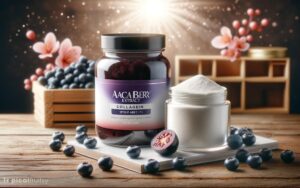Does Acai Berry Really Work: Everything You Need to Know!
Acai berries are indeed packed with nutrients and may offer health benefits due to their high antioxidant content.
However, the claims about acai berries aiding significantly in weight loss or having extraordinary anti-aging properties are not strongly supported by scientific evidence.
As with any superfood, benefits can be expected, but they should be viewed as part of a balanced diet rather than miraculous health solutions.
Acai berries are native to the Amazon rainforest and are highly nutritious, containing vitamins, minerals, and antioxidants.
The health benefits often associated with acai include:
While research has shown that acai berries have a high antioxidant capacity, which can help neutralize free radicals, their impact on weight loss and anti-aging is not conclusively proven.
Most studies indicate that while acai can be a healthy addition to the diet, it should not be relied upon for dramatic health outcomes.
Incorporate acai berries into a nutritious diet, but maintain realistic expectations about their health benefits.

Key Takeaway
Acai Berry Nutritional Benefits and Health Impact
| Nutrient | Amount per 100g | Health Benefit |
|---|---|---|
| Antioxidants | High ORAC value | Neutralizes free radicals |
| Fiber | 2-3g | Supports digestion and weight control |
| Healthy fats (Oleic acid) | Present | May improve heart health |
| Vitamin A | 15 IU | Supports vision and immune function |
| Calcium | 20-30mg | Essential for bones and teeth |
Unpacking Acai Berry Nutrition

Frequently touted for its dense nutritional profile, the acai berry contains a plethora of vitamins, minerals, and antioxidants that contribute to its health-promoting reputation.
Originating from the Amazon rainforest, this deep purple fruit is particularly rich in vitamin C, fiber, and heart-healthy fats.
It boasts an impressive concentration of anthocyanins, the compounds that give it its vibrant hue and are known for their potent antioxidant properties.
These antioxidants are crucial in combatting oxidative stress and inflammation, factors involved in chronic diseases.
Analytical studies have identified acai’s high ORAC (Oxygen Radical Absorbance Capacity) score, indicating its superior ability to neutralize free radicals.
Weight Loss Claims Examined

Investigating the myriad of weight loss claims surrounding acai berry necessitates a critical look at the scientific evidence backing these assertions.
The popularity of acai berry in diet and wellness circles has led to a proliferation of products and endorsements, each touting the fruit’s supposed weight loss benefits.
However, an evidence-based analysis reveals a more nuanced picture:
- Limited Clinical Trials: Few rigorous scientific studies specifically examine acai berry’s effect on weight loss.
- Antioxidant Content: While acai is rich in antioxidants, there is no direct correlation between antioxidants and weight loss.
- Marketing vs. Reality: Many claims are based more on marketing narratives than on scientific data.
- Overall Diet Importance: Sustainable weight loss typically involves comprehensive lifestyle changes, not just supplementation with a single product.
For those seeking understanding, it’s clear that while acai berry may contribute to a healthy diet, its role in weight loss is not well-supported by current scientific research.
Antioxidant Power of Acai

The antioxidant capacity of acai berries has been quantified using the Oxygen Radical Absorbance Capacity (ORAC) scale.
The ORAC scale provides a metric for comparing the effectiveness of different foods in neutralizing free radicals.
Studies assessing the health benefits of acai’s antioxidants suggest potential protective effects against oxidative stress. However, the clinical significance of these effects remains to be fully established.
A critical examination of the ORAC value analysis and its implications for acai consumption will elucidate the veracity of claims surrounding its antioxidant prowess.
Acai Antioxidant Comparison
Among superfoods, the acai berry is renowned for its high antioxidant content, which is often compared to that of other berries and fruits to evaluate its potential health benefits.
When assessing the antioxidant power of acai, it is crucial to consider:
- ORAC Values: Acai berries have high Oxygen Radical Absorbance Capacity (ORAC) scores, which measure the effectiveness of a substance to quench oxygen radicals.
- Anthocyanin Levels: These are flavonoids that contribute to the acai’s strong antioxidant properties, often exceeding that of other berries like blueberries and cranberries.
- Polyphenolic Compounds: Acai berries contain numerous polyphenols that have been associated with anti-inflammatory and antioxidative effects.
- Vitamin Content: While not the highest in vitamins compared to some fruits, the synergy between acai’s vitamins and its antioxidants might enhance its overall health impact.
Evidence-based analysis indicates that acai’s rich antioxidant profile may offer health benefits, although it’s important to consider the context of an overall diet.
Health Benefits Evidence
While acai berries boast a high concentration of antioxidants, scientific studies have been conducted to determine the veracity of health claims associated with their consumption.
These studies often focus on the berry’s ability to combat oxidative stress, a factor in aging and chronic diseases.
One notable investigation, published in the Journal of Agricultural and Food Chemistry, found that acai berries contain potent polyphenolic compounds capable of reducing oxidative stress markers in human subjects.
However, while laboratory tests reveal that acai has high antioxidant capacity, translating these findings to clinical benefits requires cautious interpretation.
Researchers advocate for more rigorous trials to substantiate claims of acai’s health benefits, noting that antioxidant activity in a test tube does not always equate to the same effect in the human body.
ORAC Value Analysis
Investigating the Oxygen Radical Absorbance Capacity (ORAC) value of acai berries provides a quantitative measure of their antioxidant potential, crucial for evaluating the fruit’s efficacy in combating oxidative stress.
The ORAC score quantifies the scavenging capacity of antioxidants against harmful free radicals.
A comprehensive analysis of acai’s ORAC value reveals:
- High ORAC levels compared to other fruits, indicating robust antioxidant properties.
- Potential to reduce oxidative damage when incorporated into a balanced diet.
- Correlation between ORAC values and the presence of polyphenols and anthocyanins in acai.
- A reminder that ORAC values alone do not determine health benefits; bioavailability and metabolism are also key factors.
This evidence-based examination suggests that the potent antioxidant content in acai berries may contribute to cardiovascular health, segueing into the role of acai in heart health.
Acai for Heart Health

The potential cardiovascular benefits of acai berry are attributed to its high antioxidant content, which may help to mitigate oxidative stress, a known contributor to heart disease.
Studies have examined the influence of acai consumption on blood lipid profiles, suggesting possible favorable effects on cholesterol levels, though the evidence remains mixed.
Additionally, research has begun to explore the impact of acai on hypertension, a critical risk factor for heart disease, with some preliminary findings indicating a possible benefit in blood pressure regulation.
Antioxidant Properties
Acai berries possess a high concentration of antioxidants, which may contribute to cardiovascular health by mitigating oxidative stress.
These potent compounds are integral to combating the detrimental effects of free radicals, which are known to damage cells and contribute to heart disease.
The robust antioxidant profile of acai berries includes:
- Anthocyanins: Responsible for the deep purple color of acai berries and linked to improved cholesterol levels.
- Polyphenols: Known for their role in reducing blood pressure and inflammation.
- Vitamin E: A nutrient that protects cells from oxidative damage and supports overall heart health.
- Flavonoids: Associated with a lower risk of coronary heart disease through their antioxidant activity.
Blood Lipid Effects
Following the exploration of antioxidant properties, research into the effects of acai berry consumption on blood lipid profiles has shown potential benefits for heart health.
Studies have indicated that acai berry supplementation may lead to positive changes in cholesterol levels, specifically by reducing LDL (bad cholesterol) and increasing HDL (good cholesterol).
| Study Focus | LDL Change | HDL Change |
|---|---|---|
| Acai Supplementation | Decrease | Increase |
| Placebo Group | No Change | No Change |
| Comparative Diet | Varied | Varied |
These findings suggest the acai berry could be a valuable addition to a diet aimed at improving cardiovascular health.
However, it is crucial to consider these results within the context of comprehensive dietary and lifestyle modifications.
Hypertension Impact
In assessing the role of acai berry in heart health, one area of interest is its potential influence on hypertension, a condition characterized by elevated blood pressure.
Contemporary research suggests acai berry may impact hypertension through various mechanisms:
- Antioxidant Properties: Acai berries are rich in anthocyanins and flavonoids, which are antioxidants that may help reduce oxidative stress, a contributor to hypertension.
- Anti-inflammatory Effects: Chronic inflammation is linked to high blood pressure, and acai’s anti-inflammatory capabilities could theoretically mitigate this.
- Endothelial Function: Acai consumption might improve endothelial function, thereby enhancing vasodilation and blood flow.
- Lipid Modulation: By altering blood lipid profiles, acai berries may indirectly affect blood pressure regulation.
These points, grounded in scientific inquiry, highlight a complex interplay between acai berry intake and blood pressure control.
Anti-Aging Effects Explored

Several studies have investigated the potential anti-aging properties of acai berries, focusing on their high antioxidant content.
Antioxidants are known to combat oxidative stress, which is a contributor to aging and degenerative diseases.
Acai berries contain anthocyanins, potent antioxidants that have been linked to improved cellular health.
In vitro studies suggest that these anthocyanins can help in neutralizing free radicals, thereby potentially reducing age-related cellular damage.
However, the extrapolation of these results to human aging is complex. While antioxidants from acai may offer some protective benefits, aging is a multifaceted process influenced by genetics, lifestyle, and environmental factors.
Therefore, while acai berries could complement an anti-aging regimen through their antioxidant capacity, they are not a panacea for the prevention of aging.
How Does Acai Berry Benefit the Immune System?
Acai berry immune system benefits are plentiful. This superfood is packed with antioxidants and vitamins that can help boost immune health. The high levels of vitamin C in acai berries can support the body’s natural defenses. Additionally, the antioxidants in acai berries can help to reduce oxidative stress and inflammation, further benefiting the immune system.
Understanding the Acai Hype

The surge in popularity of acai berries can be attributed to their purported health benefits and aggressive marketing strategies.
As consumers increasingly seek natural products for wellness, acai berries have been presented as a superfood with a variety of health-boosting properties. However, it’s important to dissect the claims and consider the evidence behind them.
Here are key points fueling the acai hype:
- Antioxidant Power: Acai berries are rich in antioxidants, which help combat oxidative stress.
- Weight Loss Claims: Marketing often links acai to weight loss, although scientific backing is limited.
- Celebrity Endorsements: High-profile endorsements can inflate the perceived value and effectiveness of acai products.
- Media Coverage: Sensationalized reports in the media contribute to the allure of acai berries.
An analytical approach reveals that while acai berries do possess nutritional benefits, the extent of their efficacy requires more rigorous scientific scrutiny.
Conclusion
The acai berry, while adorned in a cloak of mystique and marketed with the zeal of a panacea, ultimately succumbs to the scrutiny of evidence-based analysis.
Its nutritional profile, though respectable, hardly justifies the hyperbolic weight loss and anti-aging claims.
The berry’s true prowess lies in its antioxidant capacity, a redeeming quality that, while beneficial, is not exclusive to this Amazonian guest.
The acai berry saga stands as a cautionary tale against nutritional hyperbole.






